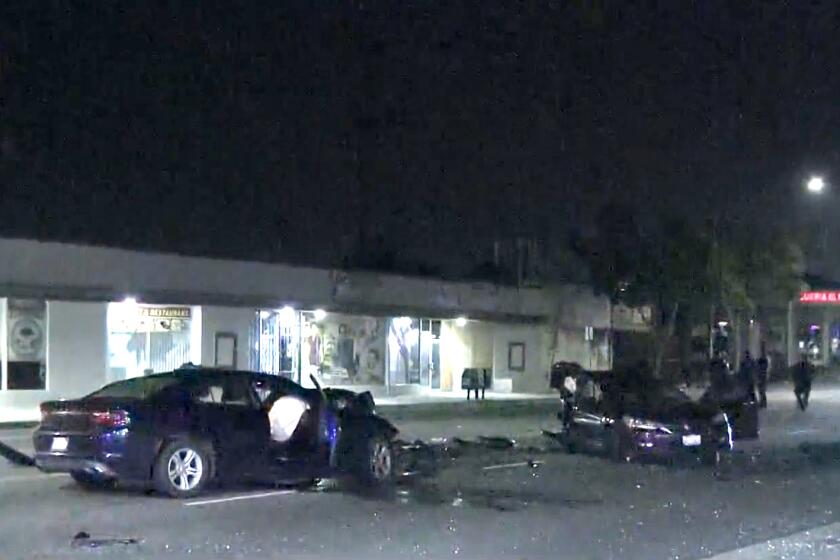L.A. grand jury issues subpoenas in Web suicide case
- Share via
A federal grand jury in Los Angeles has begun issuing subpoenas in the case of a Missouri teenager who hanged herself after being rejected by the person she thought was a 16-year-old boy she met on MySpace, sources told The Times.
The case set off a national furor when it was revealed that the “boyfriend” was really a neighbor who was the mother of one of the girl’s former friends.
Local and federal authorities in Missouri looked into the circumstances surrounding 13-year-old Megan Meier’s 2006 death in the town of Dardenne Prairie, an upper-middle-class enclave of about 7,400 people, located northwest of St. Louis.
But after months of investigation, no charges were filed against Lori Drew for her alleged role in the hoax. Prosecutors in Missouri said they were unable to find a statute under which to pursue a criminal case.
Prosecutors in the U.S. attorney’s office in Los Angeles, however, are exploring the possibility of charging Drew with defrauding the MySpace social networking website by allegedly creating the false account, according to the sources, who insisted on anonymity because they are not authorized to speak publicly about the case.
The sources said prosecutors are looking at federal wire fraud and cyber fraud statutes as they consider the case. Prosecutors believe they have jurisdiction because MySpace is headquartered in Beverly Hills, the sources said.
It’s still unclear who created the fictitious account. In a police report, Drew told authorities she, with the aid of a temporary employee, “instigated and monitored” a fake profile prior to Megan’s suicide, “for the sole purpose of communicating” with the girl and to see what the girl was saying about Drew’s daughter.
The grand jury issued several subpoenas last week, including one to MySpace and others to “witnesses in the case,” sources said. One source did not know who else had received subpoenas; the other declined to provide that information.
Thomas P. O’Brien, the U.S. attorney in Los Angeles, declined to comment. Thom Mrozek, a spokesman for O’Brien, also declined to comment.
MySpace officials could not be reached for comment, nor could Drew or her husband, Curt, be reached.
Attorney Jim Briscoe, who represents Lori Drew, said: “We have no knowledge of . . . anything dealing with a grand jury anywhere dealing with this case. . . . The only comment I have is we can’t comment on rumors from anonymous sources.”
The news came as a shock to Tina and Ron Meier, Megan’s parents. Both said they were unaware of the grand jury and had not been contacted by the U.S. attorney’s office in Los Angeles.
“If MySpace is considered the victim, fine. I don’t care at this point,” said Tina Meier, 37. “We’ve been begging for someone -- anyone -- to pick up this case. If the Drews can be charged -- and even get the chance to be convicted -- it would be a day I could be happy with.”
Cyber-bullying has become an increasingly creepy reality, with the anonymity of video games, message boards and other online forums offering an outlet for cruel taunts.
Former federal prosecutor Brian C. Lysaght said such a prosecution would be “not as much of a reach as it might appear at first glance.” In recent years, he said, Congress has passed a series of statutes that make criminal conduct involving the Internet federal offenses.
Still, it could be difficult to draw the line between constitutionally protected free speech and conduct that is illegal.
Laurie Levenson, a professor at Loyola Law School in Los Angeles, said the idea of using a fraud charge to tackle the unusual case was “an interesting and novel approach.”
“But I doubt it’s really going to lead to the type of punishment people really want to see, which is this woman being held responsible for this girl’s death,” she said.
Levenson, a former federal prosecutor, said that if the grand jury brings an indictment, it could raise 1st Amendment issues and questions about how to fairly enforce such a law on the Internet, where pseudo-identities are common.
“This may be a net that catches a lot of people,” she said.
Kurt Opsahl, a senior staff attorney who specializes in privacy and free speech issues for the legal advocacy group Electronic Frontier Foundation, said the potential of this case to set legal precedent criminalizing online speech is worrying.
“The right to speak freely online is hugely important. Whistle-blowers create pseudonyms,” Opsahl said. “So do many people who anonymously report on corporate or government bad practices.”
In the neighborhood where the Meiers and the Drews live, protecting the 1st Amendment has not been the main concern.
Teenagers and furious neighbors have protested in front of the Drews’ one-story, white house. Virtual vigilantes have posted the Drews’ home address, phone numbers, e-mail addresses and photos on websites such as RottenNeighbor.com.
Tina and Ron Meier, high school sweethearts, have struggled to deal with their daughter’s death; the couple is getting divorced. Their youngest daughter, Allison, now 11, splits her time between the two.
The mounting tension and heated emotions worried community leaders enough that they are having the St. Charles County Sheriff’s Department regularly patrol the suburban neighborhood. Late last year, Dardenne Prairie’s Board of Aldermen passed a law that makes cyber harassment a misdemeanor -- with a maximum penalty of 90 days in jail or a $500 fine or both for each violation.
A number of area communities have passed similar measures. And Missouri Gov. Matt Blunt pulled together an Internet task force, which put the final touches on a proposal Tuesday that would make it a felony crime for adults who use online technology to harass children.
Times staff writers Molly Hennessy-Fiske and Ted Rohrlich contributed to this report.
More to Read
Sign up for Essential California
The most important California stories and recommendations in your inbox every morning.
You may occasionally receive promotional content from the Los Angeles Times.











